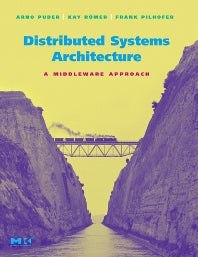Freshly Printed - allow 10 days lead
Couldn't load pickup availability
Distributed Systems Architecture
A Middleware Approach
This guide to building robust middleware includes a complete open source CORBA system
Arno Puder (Author), Kay Römer (Author), Frank Pilhofer (Author)
9781558606487, Elsevier Science
Hardback, published 25 November 2005
344 pages
23.4 x 19 x 2.4 cm, 0.84 kg
“Einstein famously posited, ‘Everything should be made as simple as possible, but not simpler.’ This modern corollary to Occam’s Razor is often honored in the breach, especially the final three words, and especially in the IT industry. Distributed systems, like security and error handling, are inherently difficult, and no amount of layered abstraction will overcome that simple fact. A deep understanding of what makes distributed systems architecture different from monolithic systems architecture is critically important in a networked world of services such as that promised by Service Oriented Architecture, and Puder, Römer and Pilhofer deliver that deep understanding in a straightforward, step-by-step fashion, from the inside out—as simple as possible, but not simpler. Every application developer today is a distributed systems developer, and this book therefore belongs on the bookshelf of every developer, architect and development manager.? --Richard Mark Soley, Ph.D., chairman and CEO, Object Management Group, Inc.
Middleware is the bridge that connects distributed applications across different physical locations, with different hardware platforms, network technologies, operating systems, and programming languages. This book describes middleware from two different perspectives: from the viewpoint of the systems programmer and from the viewpoint of the applications programmer. It focuses on the use of open source solutions for creating middleware and the tools for developing distributed applications. The design principles presented are universal and apply to all middleware platforms, including CORBA and Web Services. The authors have created an open-source implementation of CORBA, called MICO, which is freely available on the web. MICO is one of the most successful of all open source projects and is widely used by demanding companies and institutions, and has also been adopted by many in the Linux community.
Preface
1 Introduction
2 Basic Concepts
3 Introduction to CORBA
4 ORB
5 ORB Design
6 Interoperability
7 Object Adapters
8 Invocation Adapters
9 IDL compiler
10 CORBA and Beyond
Appendix A MICO Installation
B Mico Implementation Overview
C Mico Implementation Details
D Sample Application
List of Figures
Glossary
Bibliography
Index
Subject Areas: Parallel processing [UYFP], Distributed systems [UTR], Programming & scripting languages: general [UMX], Object-oriented programming [OOP UMN], Grid & parallel computing [UKG]


